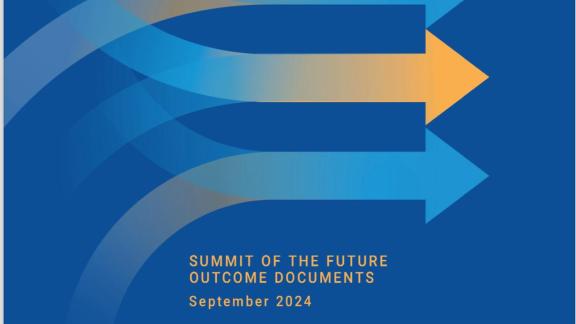What is the Summit of the Future?
It is a high-level event on September 22 and 23, bringing world leaders together to adopt the Pact for the Future, which includes two documents as annexes: a Global Digital Compact and a Declaration of Future Generations. After years of preparations and months of negotiations, the Pact for the Future –and its Annexes- was adopted by the UN General Assembly the morning of September 22. Despite flaws and gaps that will be analyzed in detail, it is important for now to mention that the Pact has explicit references to universal sexual and reproductive health and reproductive rights, and cross-cutting references to gender and human rights, including references to the Beijing and ICPD frameworks, and substantive references to sexual- and gender-based violence and conflict-related sexual violence.
The Summit intends to create a new international consensus on how to deliver a better present and safeguard the future, taking concrete steps to respond to emerging challenges. This process is crucial to shape the post-2030 Agenda landscape and to recharge multilateral commitments around the Sustainable Development Goals.
Why is the Summit of the Future important?
The Summit arrives at a pivotal moment in the global and multilateral landscape, demanding bold, transformative actions to address the intertwined humanitarian, health and climate crises, and their disproportionate impacts on women, girls, and adolescents in all their diversities. The impact of persistent sexual and gender-based violence, discrimination, and harmful practices is particularly acute in marginalized and low-income communities, where the lack of access to essential health services contributes to high rates of unintended pregnancies, maternal mortality, and sexually transmitted infections. The Summit of the Future must not only acknowledge those challenges but also commit to concrete actions that respect, protect, and fulfil the human rights of all women and girls and marginalized groups.
What has been IPPF’s role in the Summit?
IPPF has been working closely with different actors, advocating for a strong inclusion of sexual and reproductive health and rights (SRHR), gender equality, and human rights for all. Throughout the negotiation process, IPPF has engaged with stakeholders to mainstream and prioritize gender equality and the empowerment of all women and girls, including adolescents, throughout the Pact for the Future, and to reinforce human rights –including SRHR- in all the outcome documents.
What do we expect of the Summit?
The Summit is a crucial opportunity for:
-
Advancing gender equality, and SRHR on the global stage: The Summit is an opportunity to move forward, and not to go backwards. Leaders should be bold, ambitious, and unapologetic about their decision to protect human rights, including SRHR. This is all the more important as we have witnessed increased and well-funded opposition against SRHR, gender equality and human rights more broadly.
-
Honor the commitments made 75 years ago when the Universal Declaration of Human Rights was adopted, and 30 years ago, when the Beijing Platform for Action, and the Programme of Action of the International Conference on Population and Development were agreed by consensus: we cannot settle for anything less than the basic, universal and integrated principles of dignity, autonomy, and equality and non-discrimination.
-
Encourage the meaningful and inclusive participation of structurally excluded groups into all UN processes, in particular, those groups most left behind. As the movement of persons with disabilities have taught us, “nothing about us, without us.”
-
Promote the importance of civil society engagement and participation, which should be meaningful and inclusive.
-
Highlighting SRHR as fundamental for achieving sustainable development. SRHR are about enabling individuals to make informed decisions about their bodies, health, and lives, and are therefore intrinsically linked to Sustainable Development Goals 3, 4, 5, and 10, and contributes to achieving many of other targets.
when








